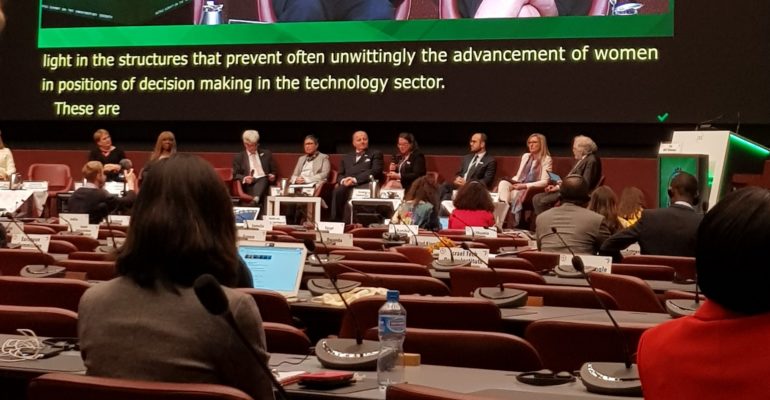A blog by Stacy Ciulik, UN Representative Geneva
“The World Summit for the Information Society (WSIS) 2019, Geneva, had a jam-packed agenda of fascinating topics relating to digitalisation and the information society. High-Level Policy Session 12 on gender mainstreaming touched upon many topics I have personally encountered as a female senior ICT consultant. This session addressed efforts being undertaken to secure gender equity in the ICT Sector and balance digital inclusion across various organisations and countries. Each of the panel member’s 3-minute talks reflected the vision of an inclusive and development-oriented information society that is centered around individuals, as outlined by the United Nations through the WSIS. It was agreed that bridging digital divides and reducing gender digital inequalities are crucial and urgent issues and that one step to addressing them is for everyone to have (preferably high speed) internet access. The panelists did an excellent job articulating existing challenges that must be overcome if true gender equity (Sustainable Development Goal #5) is to be achieved. Some of the obstacles which we must overcome are:
- Only 5% of tech start-ups in the US are owned by women
- Only 17% of ICT specialists are women
- Only 1-3% of girls in the EU consider an ICT career
- Girls are still discouraged from studying STEM subjects
- Hundreds of millions fewer women worldwide own a mobile phone compared to their male counterparts
- 250 million fewer women are using the internet than men.

Sarah Clatterbuck (Director of Engineering, YouTube-Google) said that without the representation of women, technology is and will continue to be developed with gender bias, which has grave implications for women in society. Biases are shown in artificial intelligence (AI) and machine learning. For example, studies of AI have shown that facial recognition has a 1% error rate for light-skinned men and a 35% error for dark-skinned women. Underrepresentation of women in technology represents an economic opportunity issue. Monique J. Morrow, President of The Humanized Internet, emphasised the importance of getting girls involved early, i.e. targeting kindergarten and primary schools. I ask myself, what Soroptimist International can do to assist in targeting girls at an early age? As panelist Ms Limor Schmerling declared “Never assume that the work is done! Women need to be creative, be bold! We need to educate girls better!”. Session 12 left me optimistic yet convinced that women need to be mobilized and step forward right now.”
Click the link to read more about women and girls in the technology sector: Girls in ICT.


Thank you for your blog. Not sure who you are thought as there is no name attached. I recently went to Geneva with a number of Scottish and English Soroptimists and visited the UN. We met with Kristin one of our reps.
She explained what she did in her (voluntary) role and certainly made me more aware of what I did not know about our UN reps and the work they do and the input we need to offer.
Will spread the message!
Thank you Tina – author now added! A blog by Stacy Ciulik, UN Representative Geneva.